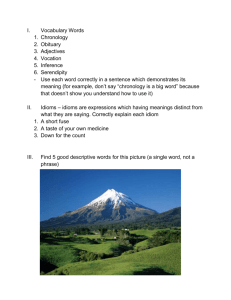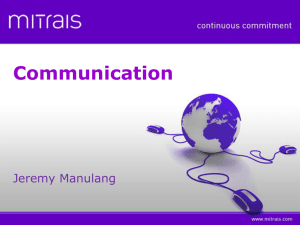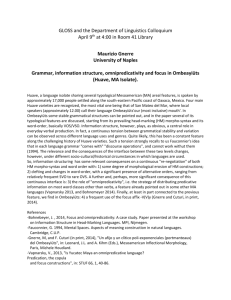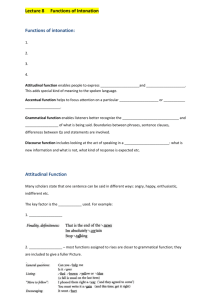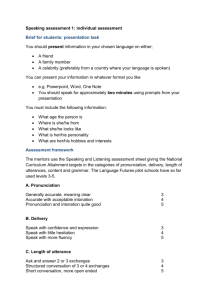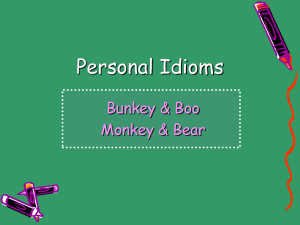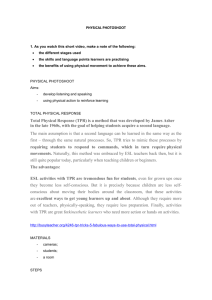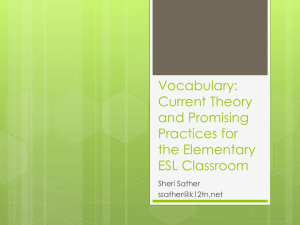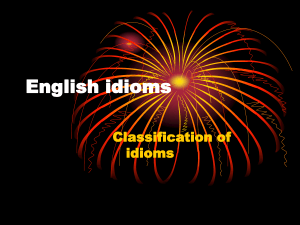Best practice rubrics v 13.05 - + ++ New teaching experience/activity
advertisement
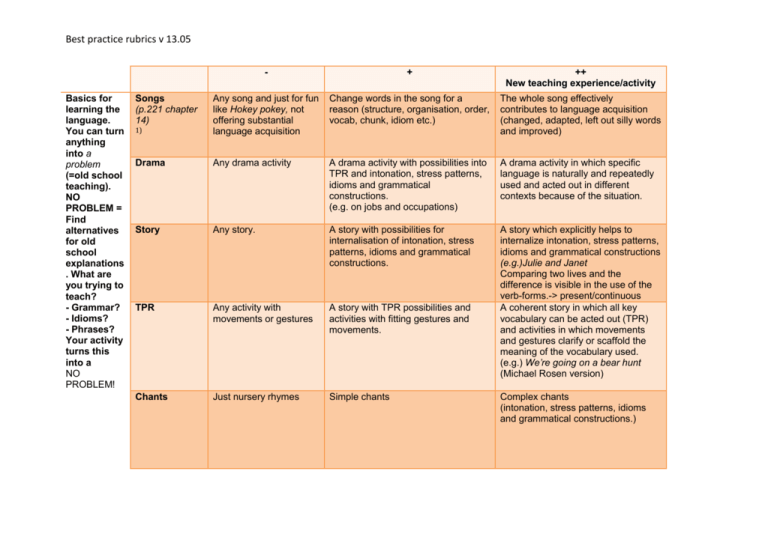
Best practice rubrics v 13.05 Basics for learning the language. You can turn anything into a problem (=old school teaching). NO PROBLEM = Find alternatives for old school explanations . What are you trying to teach? - Grammar? - Idioms? - Phrases? Your activity turns this into a NO PROBLEM! - + ++ New teaching experience/activity Change words in the song for a reason (structure, organisation, order, vocab, chunk, idiom etc.) 1) Any song and just for fun like Hokey pokey, not offering substantial language acquisition The whole song effectively contributes to language acquisition (changed, adapted, left out silly words and improved) Drama Any drama activity A drama activity with possibilities into TPR and intonation, stress patterns, idioms and grammatical constructions. (e.g. on jobs and occupations) A drama activity in which specific language is naturally and repeatedly used and acted out in different contexts because of the situation. Story Any story. A story with possibilities for internalisation of intonation, stress patterns, idioms and grammatical constructions. TPR Any activity with movements or gestures A story with TPR possibilities and activities with fitting gestures and movements. A story which explicitly helps to internalize intonation, stress patterns, idioms and grammatical constructions (e.g.)Julie and Janet Comparing two lives and the difference is visible in the use of the verb-forms.-> present/continuous A coherent story in which all key vocabulary can be acted out (TPR) and activities in which movements and gestures clarify or scaffold the meaning of the vocabulary used. (e.g.) We’re going on a bear hunt (Michael Rosen version) Chants Just nursery rhymes Simple chants Songs (p.221 chapter 14) Complex chants (intonation, stress patterns, idioms and grammatical constructions.) Best practice rubrics v 13.05 Playing a game (chapter 4.6 p.92, chapter 13 page 215) 1) ICT (p.301) 1) Games that don’t need language to play the game or win the game ++ + Games in which you only need simple A game in which you need to constructs or words to play or win the communicate in English to play game. and/or win the game. (e.g.)Who is it? Families (e.g.) Robot game Hangman Just activities to practice the language. Use of digital resources with outstanding language learning activities. (e.g.) http://www.vocabulary.co.il/ http://www.annetsmith.nl/bas isengels/animals2.htm (e.g.) http://learnenglishkids.britishcouncil.org /en/ Blended learning: Balanced use of digital tools and resources with outstanding language learning activities which not only complement but also supplement and equilibrize the regular programme. (e.g.) http://maps.playingwithmedia.com/ http://www.wrts.nl/ http://www.usbornequicklinks.com/uk/uk_homepage.asp Activating Preknowledge (chapter 6 p.105)1) What do you know about...? What is this? or opening in Dutch (p. 107 §4) 1) NO PROBLEM! v2.0 Everyday English Any English activity that explicitly helps to find out what they know. (wordweb, guessing games, bring an item, show a clip etc.) Classroom English as Singular, temporarily useful, such. Your use of English yeargroup specific activities. for organization and/or instruction. English activities that offer every student the opportunity to express exactly what he/she knows about the given subject/topic. (e.g. guess the drawing) Activity that is generally applicable in the daily/weekly programme. It is doable for everyone and requires the smallest possible amount of time and preparation. Through this activity English will become a consistent and structural part of the general curriculum. Best practice rubrics v 13.05 Boring and useless, too short piece of language practised until students fase out. Just words, offered out of context with D-E / ED translation + Activity that internalises a useful chunk of language. ++ Absolutely non-boring activity that internalises a generally useful, meaningful chunk of language that is flexibly applicable. Words in sentences offered in context with E-E explanation Topic or theme-based words offered in sentences that clarify meaning (subject) Lessonplan Introduction subject Core* Processing* In het nederlands 4 phases: Introduction Input Output / practise Transfer Including the words/chunks/sentences/structures offered Clear goals with specified knowledge, understanding and skills. Differentiated activities organised (with)in 4 phases, including a justification of the language offered and practised as well as used. Learning line Just the course book with some English added TULE and National Curriculum Code switch/transfer within subjects Language acquisition and content learning are in balance. The learning of English is integrated in acquiring subject knowledge Differentiation The offer of more or less exercises Content and process of the programme is based on learner needs CLIL English words and phrases offered in Dutch content Key concepts offered in English are related to key concepts in Dutch With thorough knowledge of learners readiness, interest and learning profile, offering everyone the content and process of the programme needed to achieve the highest possible language skill level, using assessment as learning. Key concepts in English are the same as those offered in Dutch and the language component is in balance with the subject matter offered Chunks Vocabulary acquisition 1) Praktische didactiek voor Engels in het basisonderwijs - Sibilla Oskam
